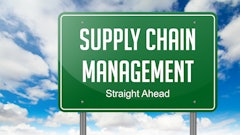London — April 4, 2007 — The European express and parcels industry is set to undergo drastic transition as globalization, deregulation of the postal sector, the wave of mergers and alliances, and booming trade and e-commerce work to transform the industry, according to a report just published by independent market analyst Datamonitor.
In its report, "Five Factors That Will Shape Future of Express Industry," Datamonitor projects that the express industry in nine European Union countries (the "EU 9" — Germany, France, UK, Spain, Italy, Belgium, Netherlands, Sweden and Poland) will grow at a compound annual growth rate of 4.1 percent to $55.1 billion by 2010 (at current exchange rates).
Global Air's Growing Impact
The air express industry is driven by just-in-time business operations and expanding international trade. Between 2006-2013, Datamonitor expects the value of the global air freight market will expand by almost 6 percent annually.
In the past decade, industries such as pharmaceuticals, semiconductors and electronics have shifted their operations to the emerging markets in order to remain operationally competitive. Indeed, the electronic goods production in developing countries has almost doubled since 2001 and accounted for nearly 43 percent of total worldwide manufacturing growth in 2005, according to data from Booz Allen Hamilton.
"Globalization supports the growth of these industries, which consequently promote express services," said Pooja Khazanchi, express analyst with Datamonitor and author of the study. "These products need faster transportation as they are either perishable or high value-low volume items; therefore they continue to dominate the growth in the global express market."
Enhancing Road Services
Khazanchi reports that express operators are now focusing on enhancing road services with improved features and standards. For example, TNT has started investing and developing its road networks in Europe to facilitate its express and parcel business in the region. It has invested more than $18.7 million in expanding and upgrading its facilities at the Duiven hub in Holland.
Elsewhere, DHL relies on its road network for the delivery of its day-definite products and also to provide the targeted capacity for time-definite services. Similarly DPD and GLS have also been expanding their road network coverage in Europe.
"Road networks have become important alongside air networks as customers are attaching more importance to reliable and timely deliveries," Khazanchi said. "Instead of plain vanilla faster transportation, the integrators are taking lead in developing their road express networks."
M&A Picking Up
Datamonitor also reported that consolidation in the global express industry is being driven by larger players expanding their network outside their domestic markets. Express operators are investing in emerging markets, a knock-on effect of which has been an increase in consolidation activity.
Consolidation is not limited to just the major express operators. "Two thousand and six saw some of the national post operators such as Austrian Post, Finland Post and Swiss Post expand their networks across Europe by acquiring smaller express companies", said Khazanchi.
"However, this has been a necessity as the smaller local companies are at risk of getting left behind by the integrators in terms of geographic reach and product scope. Looking at the product portfolio of the key postal operators in Europe (Royal Mail, DPWN, TNT, La Poste and Posten AB), the number of subsidiaries operating in express and parcels exceeds the subsidiaries of the other divisions."
Deregulation Seen Benefiting Shippers
Deregulation of the postal market by 2009 in Europe also will affect the competitive structure, services and prices in the market, according to the analyst firm. Deregulation will promote competition among players mainly in the mail reserved area, which was dominated by national operators until now, Datamonitor projects.
As the competition increases, the most affected will be national operators and small local players because competition will affect prices and squeeze margins. However, privatization will benefit customers (especially the large customers) as they will get to dominate the service providers, Khazanchi believes.
Finally, international express and business-to-consumer (B2C) parcels delivery volumes will be the driving force of the express industry, Datamonitor writes. Global e-commerce activity has grown rapidly, mainly as a result of the increased penetration of broadband internet. Although the business to business (B2B) segment dominates with majority values generated from the segment, B2C is set to experience faster growth with growing e-commerce. According to Datamonitor, B2C will become one of the key driving factors for growth in the European express and parcels delivery market.
Khazanchi concludes: "The international express and B2C parcels delivery volumes are the driving force of the express industry. Both of these are expected to remain the fastest growth sectors over the coming years. Overall Datamonitor expects the EU 9 express services to reach $55.1 billion by 2010."
In its report, "Five Factors That Will Shape Future of Express Industry," Datamonitor projects that the express industry in nine European Union countries (the "EU 9" — Germany, France, UK, Spain, Italy, Belgium, Netherlands, Sweden and Poland) will grow at a compound annual growth rate of 4.1 percent to $55.1 billion by 2010 (at current exchange rates).
Global Air's Growing Impact
The air express industry is driven by just-in-time business operations and expanding international trade. Between 2006-2013, Datamonitor expects the value of the global air freight market will expand by almost 6 percent annually.
In the past decade, industries such as pharmaceuticals, semiconductors and electronics have shifted their operations to the emerging markets in order to remain operationally competitive. Indeed, the electronic goods production in developing countries has almost doubled since 2001 and accounted for nearly 43 percent of total worldwide manufacturing growth in 2005, according to data from Booz Allen Hamilton.
"Globalization supports the growth of these industries, which consequently promote express services," said Pooja Khazanchi, express analyst with Datamonitor and author of the study. "These products need faster transportation as they are either perishable or high value-low volume items; therefore they continue to dominate the growth in the global express market."
Enhancing Road Services
Khazanchi reports that express operators are now focusing on enhancing road services with improved features and standards. For example, TNT has started investing and developing its road networks in Europe to facilitate its express and parcel business in the region. It has invested more than $18.7 million in expanding and upgrading its facilities at the Duiven hub in Holland.
Elsewhere, DHL relies on its road network for the delivery of its day-definite products and also to provide the targeted capacity for time-definite services. Similarly DPD and GLS have also been expanding their road network coverage in Europe.
"Road networks have become important alongside air networks as customers are attaching more importance to reliable and timely deliveries," Khazanchi said. "Instead of plain vanilla faster transportation, the integrators are taking lead in developing their road express networks."
M&A Picking Up
Datamonitor also reported that consolidation in the global express industry is being driven by larger players expanding their network outside their domestic markets. Express operators are investing in emerging markets, a knock-on effect of which has been an increase in consolidation activity.
Consolidation is not limited to just the major express operators. "Two thousand and six saw some of the national post operators such as Austrian Post, Finland Post and Swiss Post expand their networks across Europe by acquiring smaller express companies", said Khazanchi.
"However, this has been a necessity as the smaller local companies are at risk of getting left behind by the integrators in terms of geographic reach and product scope. Looking at the product portfolio of the key postal operators in Europe (Royal Mail, DPWN, TNT, La Poste and Posten AB), the number of subsidiaries operating in express and parcels exceeds the subsidiaries of the other divisions."
Deregulation Seen Benefiting Shippers
Deregulation of the postal market by 2009 in Europe also will affect the competitive structure, services and prices in the market, according to the analyst firm. Deregulation will promote competition among players mainly in the mail reserved area, which was dominated by national operators until now, Datamonitor projects.
As the competition increases, the most affected will be national operators and small local players because competition will affect prices and squeeze margins. However, privatization will benefit customers (especially the large customers) as they will get to dominate the service providers, Khazanchi believes.
Finally, international express and business-to-consumer (B2C) parcels delivery volumes will be the driving force of the express industry, Datamonitor writes. Global e-commerce activity has grown rapidly, mainly as a result of the increased penetration of broadband internet. Although the business to business (B2B) segment dominates with majority values generated from the segment, B2C is set to experience faster growth with growing e-commerce. According to Datamonitor, B2C will become one of the key driving factors for growth in the European express and parcels delivery market.
Khazanchi concludes: "The international express and B2C parcels delivery volumes are the driving force of the express industry. Both of these are expected to remain the fastest growth sectors over the coming years. Overall Datamonitor expects the EU 9 express services to reach $55.1 billion by 2010."


















